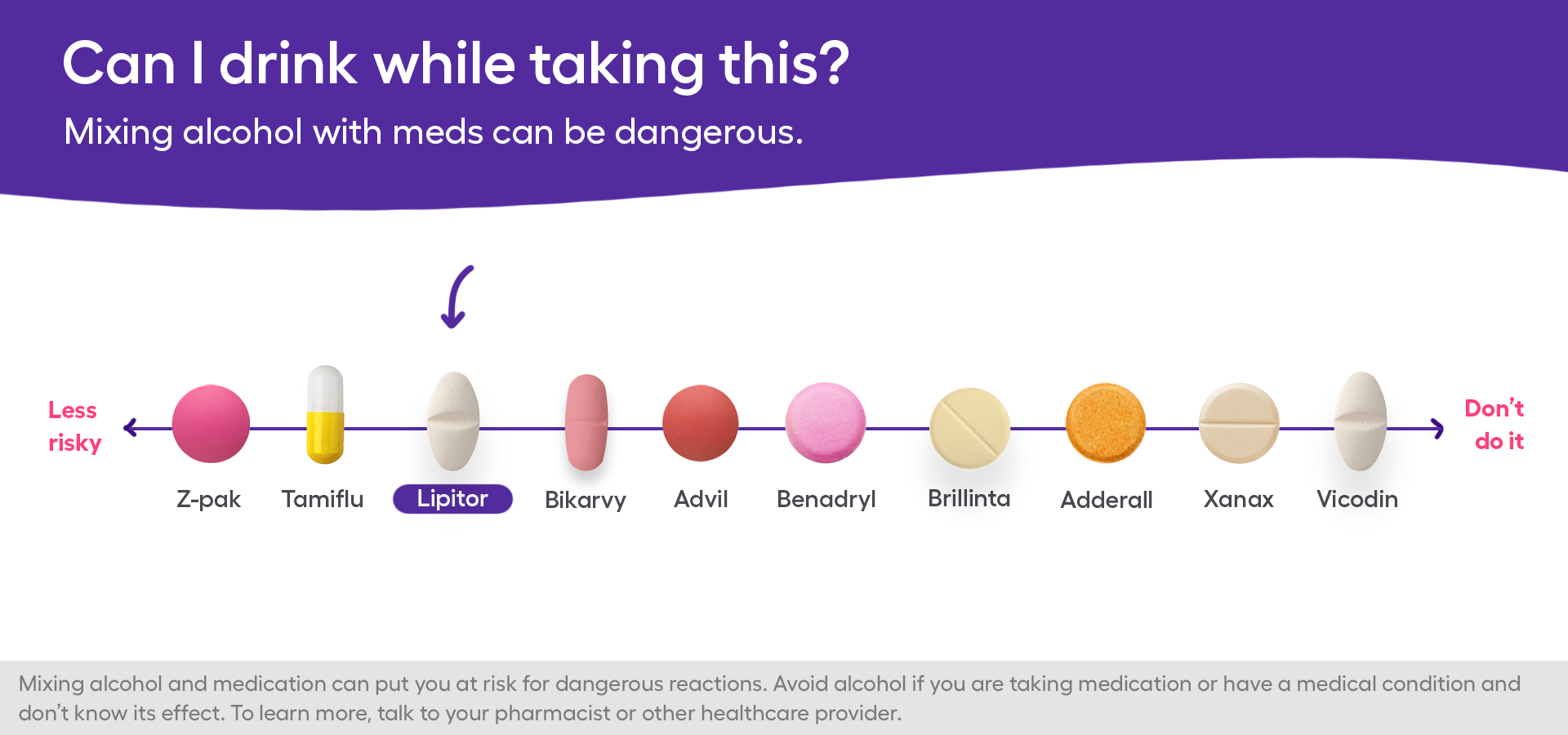Key takeaways
Lipitor and alcohol do not have a specific interaction according to the FDA, but both are processed by the liver, which could lead to issues if there is liver damage.
Common side effects of Lipitor, like upset stomach and insomnia, can be worsened by drinking alcohol, especially in heavy or chronic drinkers.
Serious liver damage can occur from mixing Lipitor and alcohol, particularly in individuals with existing liver problems, as alcohol exacerbates Lipitor’s effects on the liver.
Moderate drinking may not pose a significant risk for individuals taking Lipitor, but heavy drinking increases the risk of liver damage and can negatively impact cholesterol levels and heart health.
Lipitor is one of the most commonly prescribed drugs to treat high cholesterol. Alcohol is sold at virtually every restaurant and bar in the U.S. If you’re taking Lipitor, it can be easy to find yourself in a situation in which you might be offered a drink.
Luckily, having an occasional drink is not likely to cause any harm. There is no specific Lipitor interaction with alcohol on the drug’s Food and Drug Administration (FDA) label. However, that doesn’t mean there is no risk of an adverse effect or that you’re set for several nights of heavy drinking in a row. Both Lipitor and alcohol are mainly processed by the liver, which could lead to problems if there are signs of liver injury present.
What is Lipitor?
Lipitor (atorvastatin) is a brand-name statin drug prescribed to treat high cholesterol. Specifically, Lipitor lowers the “bad” cholesterol, also known as low-density lipoprotein (LDL) cholesterol, in the blood and increases the “good” high-density lipoprotein (HDL) cholesterol. It can also help lower certain fats in the blood called triglycerides. Lowering cholesterol may help reduce the risk of heart attacks, strokes, and other complications and adverse events.
Lipitor is taken as a daily pill in the morning or evening. However, many healthcare providers recommend taking it in the evening since most cholesterol is produced by the body at night.
RELATED: See more food, supplement, and drug interactions with LIpitor
The side effects of Lipitor and alcohol
Lipitor, like most prescription drugs, has several potential side effects. The most common side effects of Lipitor include:
- Upset stomach or abdominal pain
- Diarrhea
- Joint pain
- Muscle pain
- Abnormal liver function tests
- Common cold symptoms
- Insomnia
- Urinary tract infections
Drinking alcohol may lead to worsened gastrointestinal side effects of Lipitor, such as upset stomach and diarrhea. Alcohol can also trigger indigestion and heartburn in some people, which could magnify an upset stomach.
Chronic alcohol consumption is associated with insomnia, another side effect of Lipitor. People who drink heavily on a weekly basis are more likely to experience insomnia. Mixing alcohol and Lipitor could potentially lead to worsened problems with sleeping.
It’s not rare for some people to experience a sore throat and a stuffy nose after a night of drinking alcohol. Studies suggest that alcohol, especially red wine, can promote the release of histamine in the body, a substance involved in allergic reactions. The release of histamine can cause symptoms like a runny nose and nasal congestion. Lipitor can also cause common cold symptoms, such as a sore throat and a stuffy nose. If you already experience occasional cold symptoms while taking Lipitor, you might experience worsened cold symptoms while mixing Lipitor with alcohol.
Alcohol, Lipitor, and the liver
One serious side effect of Lipitor is abnormal liver function and liver disease. In many cases, a healthcare provider will routinely check liver function through blood tests during treatment with Lipitor. While occasional changes in liver enzymes tests are normal, persistent elevations in liver enzymes can indicate serious liver problems. Although rare, there have been reports of liver injury caused by Lipitor.
Alcohol is also well-known for causing liver problems, such as liver inflammation, scarring, and cirrhosis of the liver. Alcohol-related liver disease can be severe and irreversible, which can lead to an array of problems. Because Lipitor is processed in the liver, a damaged liver could affect how Lipitor is absorbed and processed in the body.
The blood levels of Lipitor are higher in people with chronic alcoholic liver disease than in otherwise healthy individuals without liver problems. Lipitor blood levels in people with liver disease can be around four to 16 times higher than those in people without liver disease, depending on the severity of the disease. The result of high Lipitor levels in the blood could be an increased risk of side effects, including liver damage. People with acute liver disease should not be mixing alcohol and Lipitor at all.
Alcohol’s effects on cholesterol
Some studies suggest that alcohol in moderation may be beneficial for the heart. Red wine consumed in moderate amounts (no more than two drinks per day for men and no more than one drink per day for women) may be linked to healthy cholesterol levels and a lower risk of cardiovascular disease.
Drinking heavily, on the other hand, can be tied to high cholesterol levels and poor outcomes. Heavy alcohol use may also be linked to high blood pressure and obesity, which are risk factors for heart disease.
Healthcare providers typically recommend maintaining a healthy lifestyle, including exercising regularly and eating a heart-healthy diet, while taking Lipitor. A healthy lifestyle also means watching your alcohol intake. Instead of drinking alcohol, you can eat a diet full of healthy fruits and vegetables, as well as high-fiber foods, to keep cholesterol levels in check during statin use.
Bottom line
Drinking in moderation is not likely to be a problem while taking Lipitor. The main issue with Lipitor and alcohol consumption arises if you tend to drink heavily every week. Drinking large amounts of alcohol puts you at an increased risk of liver damage, which may be worsened by Lipitor. As always, you should seek medical advice from a healthcare professional if you have concerns about how to take prescription statin therapy, such as Lipitor.




